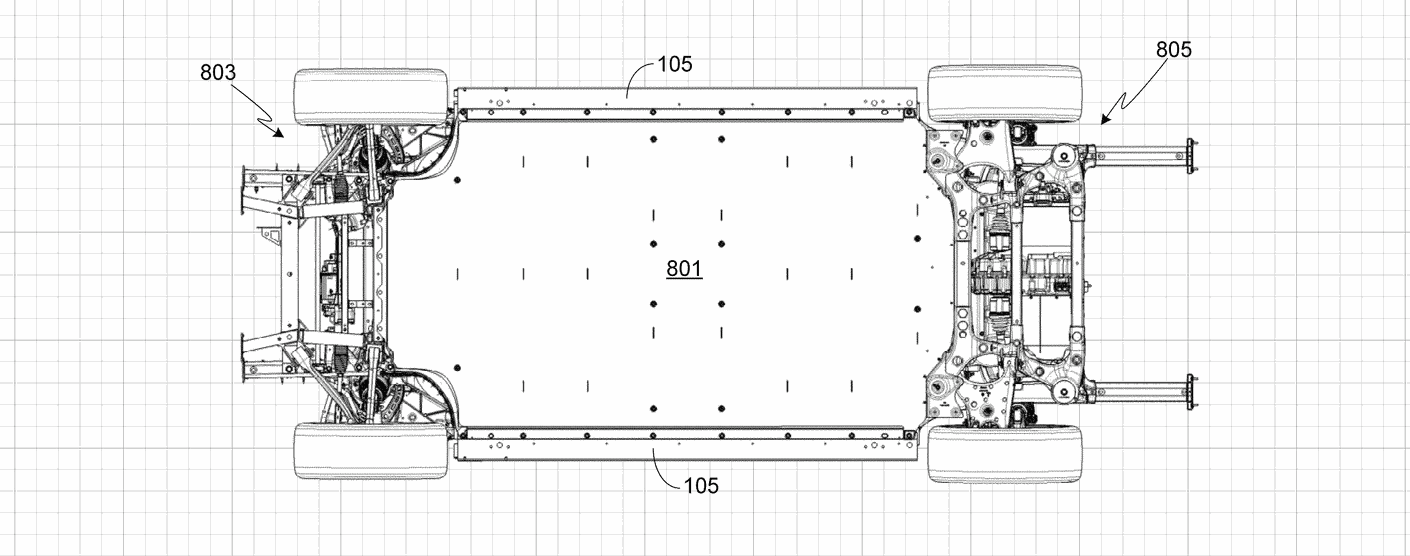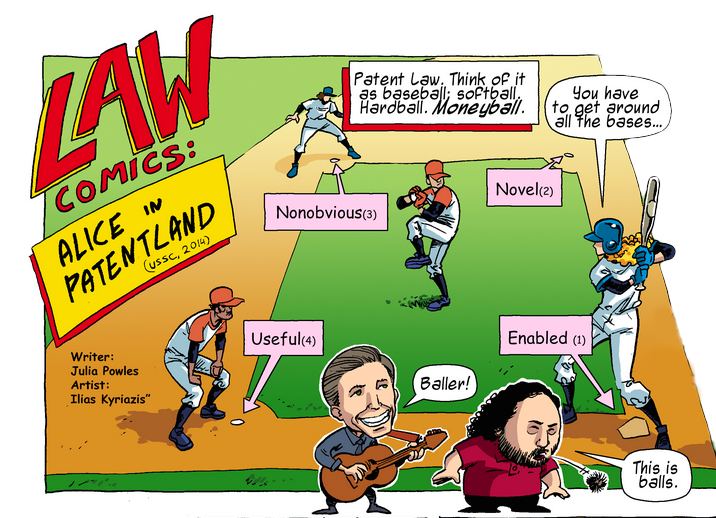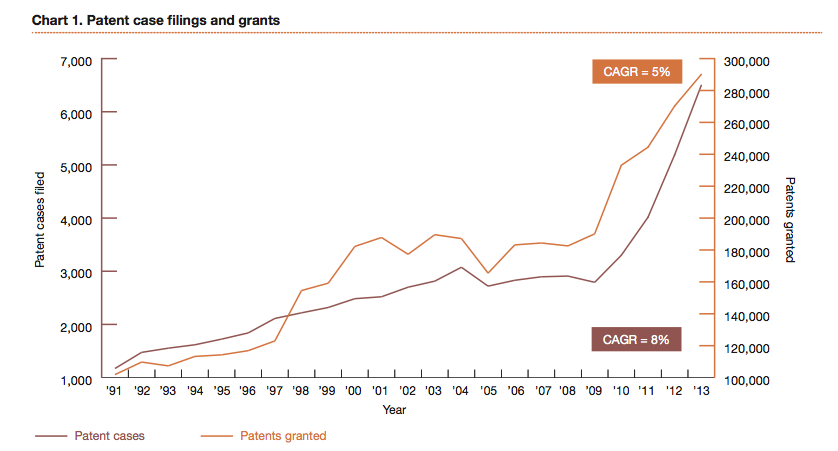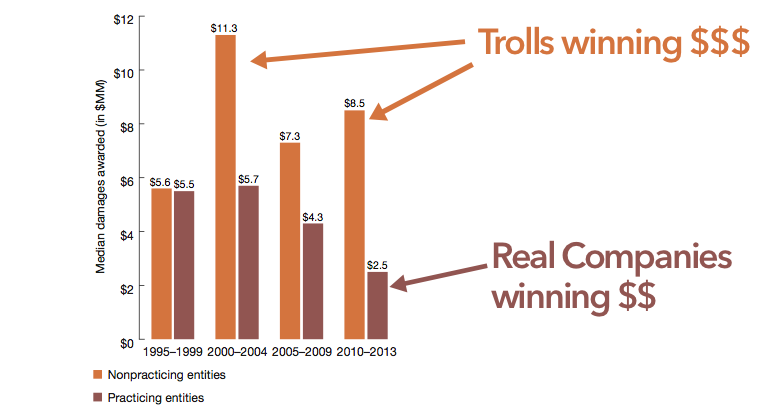There’s lots of good news in the battle against trolls and frivolous patent lawsuits. The Supreme Court is weighing in on the fight in a big way, Elon Musk set an example by open sourcing all of Tesla’s patents, and Google’s Eric Shulman has an interesting new “License on Transfer” project. In the bad news category, Congress failed to pass anti-troll legislation. And in news of the weird, the Chief Judge of the Federal Circuit resigned after a minor scandal.
The Good: Supreme Court Weighs in Against Trolls with 5 Unanimous Decisions.
The Supreme Court rarely hears patent cases. So its a big deal that the Court issued 5 unanimous patent decisions this summer. Although none of the decisions directly involved patent trolls, the Supreme Court ruled against patent holders in each case. All of the decisions should hurt patent trolls. Here’s a short plain-language summary of each.
No Patent for “Doing it on a Computer”
Alice v. CLS Bank says that taking an idea and “doing it on a computer” is not an invention and can’t be patented. In this case, the Supreme Court found that taking the “abstract idea” of intermediated settlement and “doing it on a computer” was not an invention worthy of a patent. This decision should make it easier to invalidate a number of old software patents being used by trolls. EFF’s Take.
@juliapowles summarizes Alice v. CLS in comic form!
Prof. Donald Chisum offers a more detailed analysis of what constitutes an unpatentable “abstract idea.”
No Overly Vague Patents
Nautilus v. Biosig says that overly vague patents are invalid. In the legalese, patent claims are “invalid” for “indefiniteness” if they fail to describe the invention with “reasonable certainty.” Again this should make it easier to invalidate a number of notoriously vague software patents.
Make Plaintiff’s Pay for Frivolous Lawsuits
Highmark v. Allcare and Octane v. Icon are sister cases. Both are about punishing plaintiffs for filing frivolous patent lawsuits. Octane sets the standard for when a plaintiff can be punished, and Highmark sets the standard for when a plaintiff can appeal the punishment.
Octane v. Icon says that judges can punish plaintiffs that file “exceptionally” weak patent lawsuits by forcing them to pay the defendant’s legal bills (called “fee shifting”). Judges are no longer required to apply the rigid “subjective bad faith” and “objectively baseless” framework before imposing a fee-shifting punishment. Instead, judges can look at all of the relevant facts to determine which cases are “exceptional” and warrant “fee shifting.”
Highmark v. Allcare says that if a judge decides to punish a plaintiff for filing a frivolous lawsuit, this decision can only be overturned on appeal if the trial judge was “abusing her discretion.” Since appellate judges don’t like to accuse trial judges of “abusing discretion”, trial judges have a free hand to impose fee shifting penalties. This should make it easier for courts to punish patent trolls.
No “Inducing” Infringement without Actual Infringement.
Limelight v. Akamai involves some complicated patent law. Imagine two people, Barry and Joe. Barry makes the top half of a widget and Joe makes the bottom half. The gist of the Limelight decision is that neither Joe nor Barry can be liable for patent infringement unless the end widget, when assembled, would infringe the patent. In the legalese, a defendant can’t be liable for “inducing” a third party’s infringement (§271(b)) if there was no direct infringement (§271(a)) in the first place. Dennis Crouch at PatentlyO has more.
Plaintiff Always Has Burden of Proving Infringement
Medtronic v. Boston Scientific is another case involving complicated patent law. Some background first: I could buy a license from a patent owner, and then turn around and sue the patent owner to invalidate the patent I just licensed. Buying a license first is like an insurance policy. If the court determines that the patent is invalid, I can stop paying the license. If the patent is found valid, I still have a license, so I haven’t infringed anything.
This Medtronic case is about the burden of proof in such a license-and-litigate scenario. The Supreme Court decided that the patent owner still bears the “burden of persuasion” on the issue of whether the company that bought the license is actually infringing the patent.
Thats 5 cases, and 5 wins for defendants in frivolous patent lawsuits.
The Bad
Patent Reform Dies in Senate
Anti-patent troll legislation stalled in May. While Obama-supported patent reform passed the House, it died in the senate judicial committee. According to the NY Times,
“heavy lobbying by pharmaceutical and biotechnology companies, universities and trial lawyers prevented the bill from advancing.”
The proposed law would have required patent trolls (generally shell companies) to identify their true owners. This is useful because the true owners are frequently hedge funds that would prefer not to be associated with patent trolls.
As always, check out Patent Progress for the latest on patent troll legislation.
More Patent Litigation, and More $$$ for Patent Trolls
According to a recent PWC study, there were 6,500 patent lawsuits filed in 2013. About 2/3 of these patent cases were filed by trolls (“Non-Practicing Entities”, as the report politely calls them).
Sadly, patent trolls are winning more money at trial, while companies that actually make things are winning less.
Perhaps the most important statistic in the report is that patent trolls only win 26% of cases. Keep this figure in mind if you’re ever negotiating a settlement.
The Ugly: Chief Judge of the Federal Circuit Resigns Over Minor Scandal
The Federal Circuit is the court that hears appeals from every patent lawsuit in the country. After the Supreme Court, the Federal Circuit is the highest patent court.
Randall Ray Rader, the Chief Judge of the Federal Circuit, resigned in June after an email surfaced that raised questions about his impartiality. Rader had emailed a lawyer who argued Federal Circuit patent cases, and called this lawyer’s work “IMPRESSIVE in every way” and signed off, “Your friend for life, R.R.R.” Its easy to suspect Judge Rader’s impartiality.
Judge Richard Kopf, offers excellent commentary. Kopf has some sympathy, but calls Rader’s email “overly effusive” and “plainly improper.” (Kopf has also recently suggested the Supreme Court should “STFU”, re: Hobby Lobby.)
Does Rader’s resignation help the fight against patent trolls? Probably. Judge Rader was intelligent, but his rulings tended to favor broad software patents. We’re still waiting to see who will replace Rader. Hopefully Obama will appoint someone willing take a stand against overly broad software patents and frivolous litigation.

Bonus: More Good Patent News
Tesla Open Sources its Patents.
Tesla and Elon Musk are granting free licenses to anyone who wants to use Tesla’s patented technology. On June 12, 2014, Tesla make the announcement under the headline “all our patents are belong to you.” This is pretty cool, and sets an interesting example for other innovators in the technology industry.
License on Transfer
This is complicated, but its worth understanding. I heard Google’s Eric Schulman talk about his License on Transfer ideas while we were working on the Defensive Patent License. They are important ideas, and Newegg, Canon, Dropbox, SAP, and Asana have joined Google to create the initial “license on transfer” group.
Goal: De-weaponize patents before patent trolls can acquire them.
Background: Patent trolls tend to buy up patents from struggling technology companies, and then use these patents as the basis for frivolous litigation.
License on Transfer: Anyone with patents can join the group (small fee applies). When someone n the License on Transfer group sells a patent, they automatically grant a license the patent to everyone else in the group. This means that if Dropbox sells patent ‘789 to a patent troll, everyone in the License on Transfer group will be immune from that troll’s lawsuits, because they have will all have a free license to use patent ‘789. Pretty sweet deal. Of course, the troll that bought patent ‘789 can still use it to sue any company thats not part of the License on Transfer group. Also, License on Transfer does not stop patent trolls from asserting patents they already own.
License on Transfer Link Roundup:
- IP Nav - A patent monetization firm is “utterly mystified as to why anyone in his right mind would agree to any of Google’s proposed licenses.”
- Ars Technica
Planet Money Podcasts
The July 9, 2014 Planet Money podcast was about the Case Against Patents.
On today’s show… we talk to two guys who say we should get rid of patents altogether. If someone has an idea, anyone else is free to steal it.
Thats the major patent news from the summer so far. Let me know if I’ve made any errors. I tried to write about the Supreme Court cases for a non-lawyers, so I’m glossing over a lot of nuance to get to the gist of each case.


